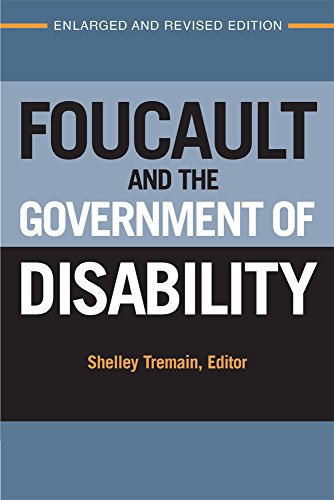Foucault and the Government of Disability (Corporealities
Discourses Of Disability)
Shelley Lynn Tremain
BOOK REVIEW

In Foucault and the Government of Disability, Shelley Lynn Tremain takes us on an exhilarating exploration that dismantles the intricate architecture of power, societal norms, and the treatment of disabilities. This isn't just a book; it's an invitation to rethink the very foundations upon which our perspectives of disability stand. With razor-sharp insights and a critical eye that cuts through the chaos of modern discourse, Tremain deconstructs the societal structures that frame disability as something to be managed, governed, or even "cured." In her hands, we confront the unsettling truth about how power operates - not merely in overt systems like governance but also in the subtleties of everyday language and belief.
The backbone of Tremain's argument is deeply rooted in the works of Michel Foucault, a philosopher whose ideas have been both transformative and controversial. By invoking Foucault's theories of biopower - the control over bodies and populations - Tremain helps us understand how disability has historically been a site of surveillance, regulation, and normalization. She compellingly argues that the governmentality surrounding disability is informed not just by the desire to manage physical bodies but also by the urgency to maintain societal norms that privilege able-bodied individuals. This intersection of ability, power, and societal expectation creates a disturbing narrative that often marginalizes those who do not fit the mold.
Readers have expressed a mix of admiration and challenges regarding Tremain's bold assertions. Some are invigorated by the unapologetic call for a radical reevaluation of disability rights and advocacy, captivated by her ability to link theory with the real-world implications faced by the disabled community. Others, however, recoil at her approach, arguing that it risks alienating potential allies in the quest for social justice. Yet, perhaps that's precisely Tremain's point: discomfort is a necessary catalyst for change.
The emotional resonance of her writing compels us to reflect on our complicity in a system that often perpetuates harmful stereotypes and stigmas. Tremain's work acts as a mirror, reflecting not only the flaws in societal structures but also the biases harbored within our own consciousness. She doesn't just want you to read her words; she wants you to FEEL them - to confront the unease that arises when we consider how society defines normalcy. 😱
As you journey through her carefully crafted arguments, you'll encounter an array of historical and contemporary examples that highlight the struggles faced by individuals with disabilities. Tremain weaves stories of resilience and defiance, illustrating how disabled activists have fought against institutional barriers and societal perceptions. Their voices are not just heard; they are amplified, resonating with urgency and passion that leave an indelible mark on the reader's psyche.
Imagine being compelled to reconsider your own beliefs about disability - to question not only your understanding but also your emotional responses. Tremain's work is transformative in that it demands that we not only engage with the text intellectually but also reflect emotionally. This is not merely an academic discourse; it's a clarion call to action and empathy.
Tremain's examination of disability also invites a broader discussion on the implications of labeling and governance. What does it mean to be categorized? How do these categories shape our experiences and identities? The power of language looms large - it can empower or it can imprison, it can liberate or it can confine. As she boldly navigates through the labyrinth of discourse surrounding disability, Tremain encourages us to rethink and rearticulate our understanding of identity in a world plagued by categorization.
Throughout this expansive work, readers are gifted with a profound sense of solidarity. Tremain's passionate advocacy aligns with the voices of those who have been historically sidelined, reminding us that the fight for justice is far from over. Her writing burns with a fiery intensity that urges you to act, to speak out, and to stand in alliance with the marginalized. This book offers not just knowledge but also empowerment - a call to arms for a more inclusive future.
As we ponder the complex relationship between disability and governance, we cannot ignore the historical context from which these discussions arise. Tremain deftly situates her arguments within contemporary debates while acknowledging the legacies of discrimination that continue to echo today. The tensions between progress and oppression are palpable, and her work serves as a vital reminder that advocacy must be grounded in both history and hope.
In closing, Foucault and the Government of Disability is not just a book to read; it's a clarion call, challenging us to confront uncomfortable truths and igniting a fire within us to foster a more equitable society. Whether you find yourself celebrating her insights or grappling with her challenges, one thing is clear: this work is essential, provocative, and downright necessary. Failure to engage with it might mean missing out on a transformative dialogue about power, identity, and the human experience. Your perspectives will never be the same again. 🌟
📖 Foucault and the Government of Disability (Corporealities: Discourses Of Disability)
✍ by Shelley Lynn Tremain
🧾 440 pages
2015
#foucault #government #disability #corporealities #discourses #disability #shelley #lynn #tremain #ShelleyLynnTremain